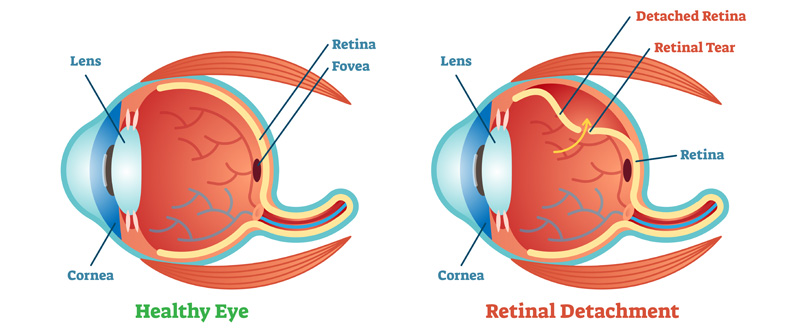Retinal Detachment
Retinal Detachment & Its Treatment
When the place of the retina is misplaced and is pulled away in the back of the eyes, Retinal Detachment occurs. The retina is a kind of layer of tissue that is very light-sensitive and that creates a line inside the eye and then send the visual message to the brain through the optic nerve. If the retinal detachment is not detected in time and not treated well, this might cause permanent vision loss.
What are the types of Retinal Detachment ?
There are three types of Retinal Detachment:
Rhegmatogenous Retinal Detachment If there is found any holes or breaks in the retina, this condition is called rhegmatogenous retinal detachment. This causes the fluid to pass into the space between the retina and other layers of the eyes.
Exudative or Secondary Retinal Detachment: Infection and inflammation can harm the eyes and leads to vision loss but when that inflammation causes the fluid to accumulate underneath the retina without the presence of a hole or break, an exudative retinal detachment occurs.
Tractional Retinal Detachment: As in the case of diabetic retinopathy there is a situation called Tractional Retinal Detachment. In this case, fibrovascular tissue on the surface of the retina pulls the retina from the underline tissue which causes a major problem in the eyes.

What causes Retinal Detachment?
Symptoms
Some of the symptoms of RD:
Flashes of Light (Photopsia)
Floaters
Treatment
How to treat Retinal Detachment:
Scleral bucking
Vitrectomy
What are its symptoms?
Flashes of Light (Photopsia): If you face any trouble while exposed to the lights and their flashes it is called photopsia. It is mostly experienced in the temporal part of the vision which is outside away from the nose.
Floaters: If you see any black cob-web spot floating in front of the eyes.
If you see a curtain-like shadow coming in front of the eyes and haltering the vision.
When the macula detached, a sudden vision loss happens that can be because of this problem.
Who can suffer from Retinal Detachment?
People of all age can be affected by retinal detachment but it is very common in people who is above 40. But it can’t be said that it doesn’t affect below 40 people. Some common reasons develop RD and the include:
People who have just done their cataract surgery.
Who have high myopia, especially with more than 5 Dioptre.
If there is retinal detachment in the other eye there is a high chance of facing this problem in both eyes.
If retinal detachment is genetic.
If there is another disease like retinoschisis, designative myopia or lattice degeneration.
After facing any eye injury there is a chance of RD followed by that.
Treatment options for RD?
laser photocoagulation or cryopexy which is a freeze treatment is used to treat Retinal holes or breaks. It is an outside procedure. It needs welding while the laser treatment is done. A dots like burn are placed around the whole at the time of treatment. The surrounded part is made frozen in Cryopexy. It helps to reattach the retina. RD problem is treated with surgeries that are scleral buckling and complex vitreoretinal surgery. In this case, silicon oil or gases are used to get the success of the procedures.
Scleral bucking: In this surgery, a silicone band is placed and that is anchored with stitches around the eyeball so that it can gently push the wall of the eye against the detached retina.
Vitrectomy: A tiny incision in the sclera is needed for this treatment. The vitreous gel is taken out with the help of vitrectomy instruments which are placed inside the eye and then it is replaced with silicon oil or gases to push the retina in its place. After that, a laser or Cryopexy is done around the brakes so that it can seal them.
Almost 90% of the patient gets their vision back after modern vitreoretinal instrumentation. It is more beneficial if the retinal detachment is repaired before the macular detaches. Because certain parts of the retina are responsible for fine and detailed vision. Contacting a retina surgeon or an opthalmologist in time is recommended when you see floaters in the eyes, when you face troubles in the flashes of lights, or when you see a curtain in the field of vision.





